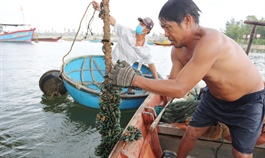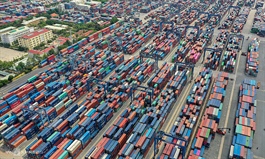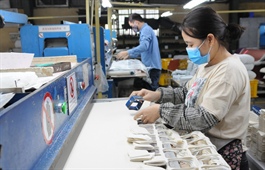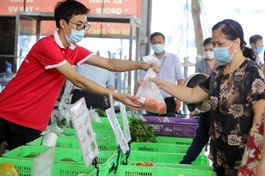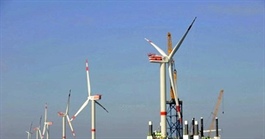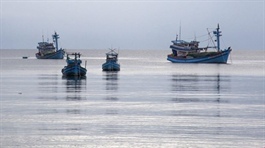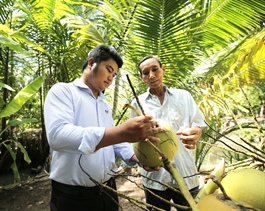Viet Nam urged to develop its Halal industry
Viet Nam urged to develop its Halal industry
Viet Nam needs to accelerate the development of its Halal industry in the near future in order to take full advantage of the lucrative market, said Deputy Minister of Foreign Affairs Pham Quang Hieu.

Hieu delivered the statement at a workshop held virtually by the Ministry of Foreign Affairs on Tuesday. The event was one of the ministry’s initiatives to boost Vietnamese exports to the Halal market and built a strategic and comprehensive plan for the industry in Viet Nam.
Halal foods are "permitted" and "legal" products under Islamic Law with extremely detailed and strict standards.
The global Halal market has huge potential and was growing fast with promising prospects due to the Muslim population which was growing globally from Southeast Asia, South Asia to the Middle East and North Africa, Hieu said.
He added the Halal economy was very diverse and comprised seven main sectors, including food, pharmaceuticals, cosmetics, tourism, fashion, Islamic finance, media and entertainment. In which, food and Islamic finance were two areas less affected by the COVID-19 pandemic. The two areas were forecast to recover and further develop after the pandemic.
Particularly, the Halal food industry covered not only production and processing but also related to many other fields such as raw materials and logistics services (preservation, packaging and transportation). Therefore, the development of the Halal food industry, or the larger Halal industry, will promote the development of ancillary services and fields.
Meanwhile, the trend of using Halal products was also increasing, even among non-Muslims because Halal products met environmental and food safety criteria.
But Hieu said Viet Nam’s market share in the global Halal market was quite modest as Vietnamese producers had been struggling to obtain Halal certification.
According to preliminary statistics from localities, about 58.7 per cent of provinces and cities nationwide had initially exported Halal food to foreign markets while nearly 41.3 per cent failed to have certified Halal products.
Additionally, Halal standards and regulations were increasingly tightened and a Halal certification was not permanent and equally recognised by countries. Vietnamese firms were also facing stiff competition from many rivals who had already established strong footholds in the Islamic markets, Hieu added.
However, participants at the event agreed that despite all these, the global Halal market remained promising for Viet Nam as the country held competitive edges in food production, tourism, textile and garment, and pharmaceuticals, which were dubbed pillars of the Halal economy.
It has also signed many free trade agreements (FTAs), including a number of new-generation deals, such as the Comprehensive and Progressive Agreement for Trans-Pacific Partnership (CPTPP), EU-Viet Nam FTA (EVFTA), and Regional Comprehensive Economic Partnership (RCEP).
In order to not miss any chance to access the Halal market, it was critical for Viet Nam to step up international cooperation to shape suitable strategies for the development of the Halal industry, they said.
Fostering co-operation in developing regulations and standards for Halal products and Halal certification organisations in Viet Nam in harmony with that of major importing countries would be also needed. That would facilitate the trade of Halal products globally while promoting the exchange of Halal products and services of Viet Nam with global Halal markets, participants suggested.
In the future, Hieu said, the Ministry of Foreign Affairs will work closely with other ministries, agencies and sectors, research institutes and businesses and associations to draw up development strategies for Viet Nam's Halal industry, which would focus on strengthening bilateral co-operation between Viet Nam and partners on Halal products as well as signing agreements on increasing the production and distribution of Viet Nam's Halal food to key markets.
Facilitating bilateral and multilateral agreements on mutual recognition of Halal certifications and organisations granting Halal certification and seeking foreign investment in Viet Nam's Halal industry would be also prioritised.
The Global Halal Food Market Report 2021-24 published by DinarStandard estimates global halal food trade to be valued at US$129 billion in 2019 and is projected to reach $140 billion by 2024.
This increasing trend was largely driven by an increase in consumer demand, followed by a rising Muslim population globally, the report said, adding that the industry was also witnessing an increasing preference for convenient, nutritionally enriched, and functional food & beverages amid the COVID-19 pandemic.
The Islamic economy space had also attracted the attention of top global brands creating innovative products and services across sectors. The governments of both OIC and non-OIC countries, food companies, and the private sector were making significant investments in the Halal market, according to the report.








